PHIL 1101: Analysis of Descartes' Cogito, ergo sum Argument
VerifiedAdded on 2022/08/26
|6
|1258
|26
Essay
AI Summary
This philosophy paper critically examines René Descartes' "Cogito, ergo sum" argument. It begins by outlining Descartes' quest for an indubitable truth and his method of Cartesian doubt, which leads him to the conclusion "I think, therefore I am." The paper then argues that the Cogito is not a deductive inference but rather an axiomatic truth. However, it contends that the argument is metaphysically untenable, as defining something does not establish its existence. The paper further critiques Descartes' notion of a permanent self, drawing on criticisms from Kant and Hume. Ultimately, it concludes that while Descartes' argument is significant for epistemology, it is not entirely acceptable due to its inherent flaws in establishing the existence of mind based on thought.
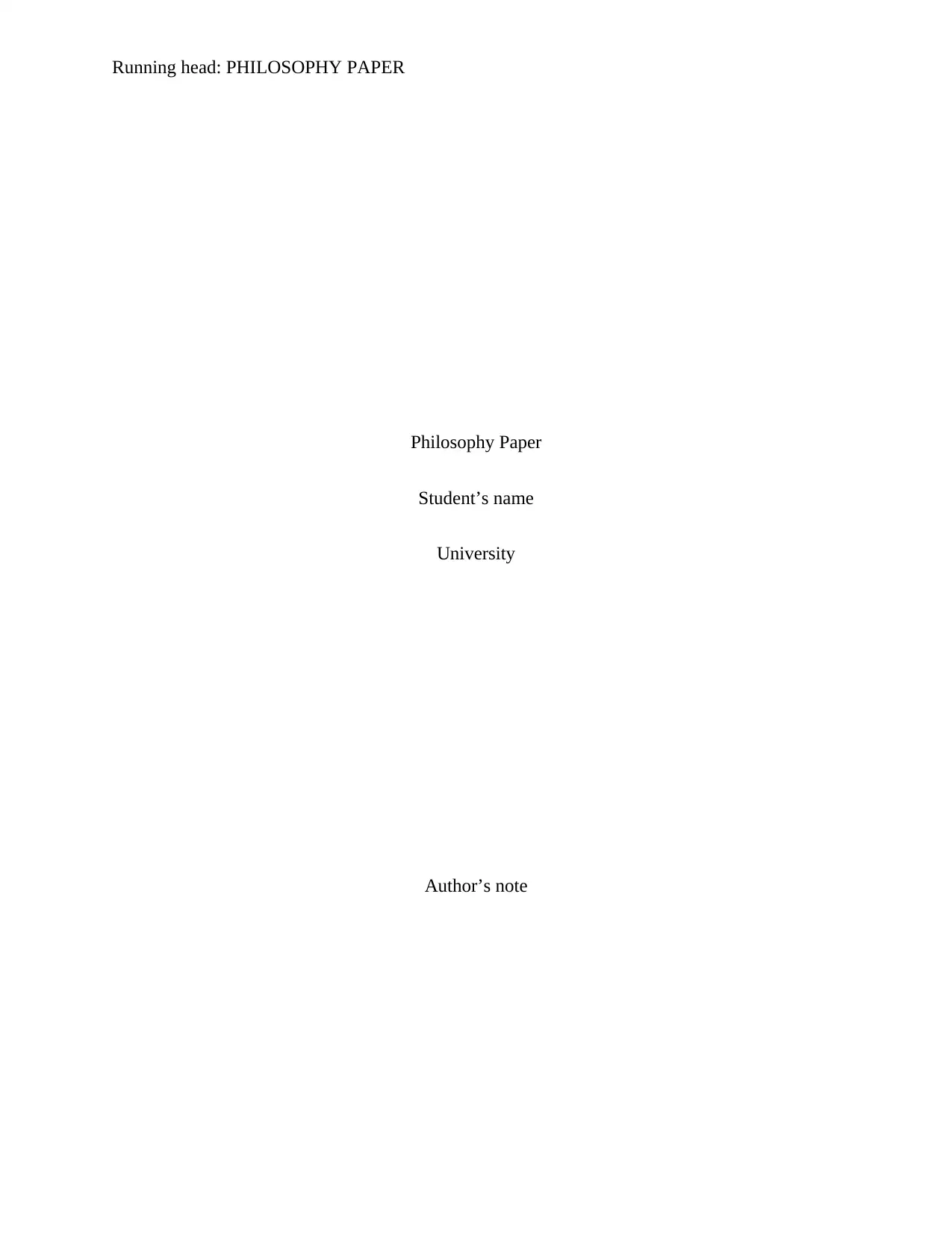
Running head: PHILOSOPHY PAPER
Philosophy Paper
Student’s name
University
Author’s note
Philosophy Paper
Student’s name
University
Author’s note
Paraphrase This Document
Need a fresh take? Get an instant paraphrase of this document with our AI Paraphraser
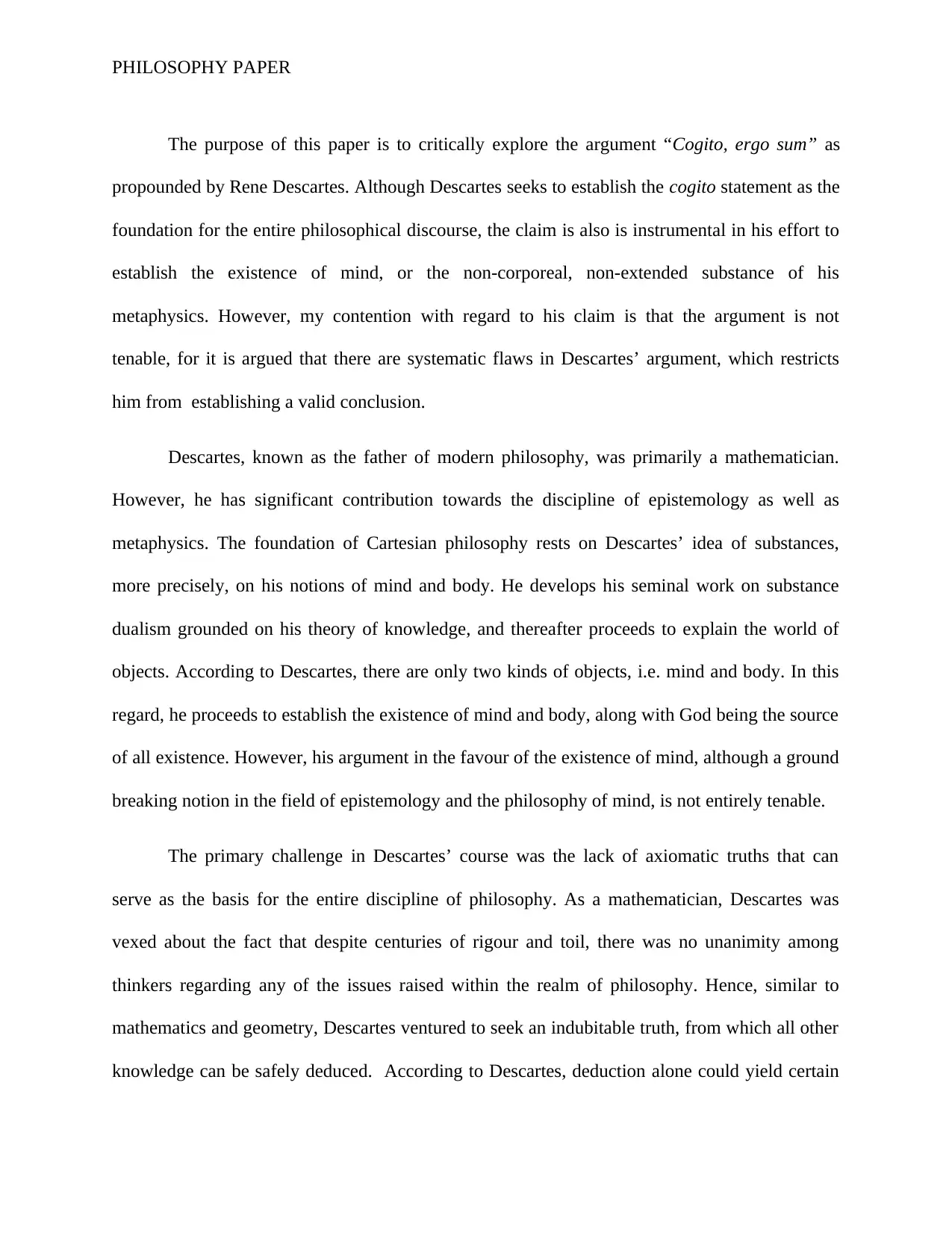
PHILOSOPHY PAPER
The purpose of this paper is to critically explore the argument “Cogito, ergo sum” as
propounded by Rene Descartes. Although Descartes seeks to establish the cogito statement as the
foundation for the entire philosophical discourse, the claim is also is instrumental in his effort to
establish the existence of mind, or the non-corporeal, non-extended substance of his
metaphysics. However, my contention with regard to his claim is that the argument is not
tenable, for it is argued that there are systematic flaws in Descartes’ argument, which restricts
him from establishing a valid conclusion.
Descartes, known as the father of modern philosophy, was primarily a mathematician.
However, he has significant contribution towards the discipline of epistemology as well as
metaphysics. The foundation of Cartesian philosophy rests on Descartes’ idea of substances,
more precisely, on his notions of mind and body. He develops his seminal work on substance
dualism grounded on his theory of knowledge, and thereafter proceeds to explain the world of
objects. According to Descartes, there are only two kinds of objects, i.e. mind and body. In this
regard, he proceeds to establish the existence of mind and body, along with God being the source
of all existence. However, his argument in the favour of the existence of mind, although a ground
breaking notion in the field of epistemology and the philosophy of mind, is not entirely tenable.
The primary challenge in Descartes’ course was the lack of axiomatic truths that can
serve as the basis for the entire discipline of philosophy. As a mathematician, Descartes was
vexed about the fact that despite centuries of rigour and toil, there was no unanimity among
thinkers regarding any of the issues raised within the realm of philosophy. Hence, similar to
mathematics and geometry, Descartes ventured to seek an indubitable truth, from which all other
knowledge can be safely deduced. According to Descartes, deduction alone could yield certain
The purpose of this paper is to critically explore the argument “Cogito, ergo sum” as
propounded by Rene Descartes. Although Descartes seeks to establish the cogito statement as the
foundation for the entire philosophical discourse, the claim is also is instrumental in his effort to
establish the existence of mind, or the non-corporeal, non-extended substance of his
metaphysics. However, my contention with regard to his claim is that the argument is not
tenable, for it is argued that there are systematic flaws in Descartes’ argument, which restricts
him from establishing a valid conclusion.
Descartes, known as the father of modern philosophy, was primarily a mathematician.
However, he has significant contribution towards the discipline of epistemology as well as
metaphysics. The foundation of Cartesian philosophy rests on Descartes’ idea of substances,
more precisely, on his notions of mind and body. He develops his seminal work on substance
dualism grounded on his theory of knowledge, and thereafter proceeds to explain the world of
objects. According to Descartes, there are only two kinds of objects, i.e. mind and body. In this
regard, he proceeds to establish the existence of mind and body, along with God being the source
of all existence. However, his argument in the favour of the existence of mind, although a ground
breaking notion in the field of epistemology and the philosophy of mind, is not entirely tenable.
The primary challenge in Descartes’ course was the lack of axiomatic truths that can
serve as the basis for the entire discipline of philosophy. As a mathematician, Descartes was
vexed about the fact that despite centuries of rigour and toil, there was no unanimity among
thinkers regarding any of the issues raised within the realm of philosophy. Hence, similar to
mathematics and geometry, Descartes ventured to seek an indubitable truth, from which all other
knowledge can be safely deduced. According to Descartes, deduction alone could yield certain
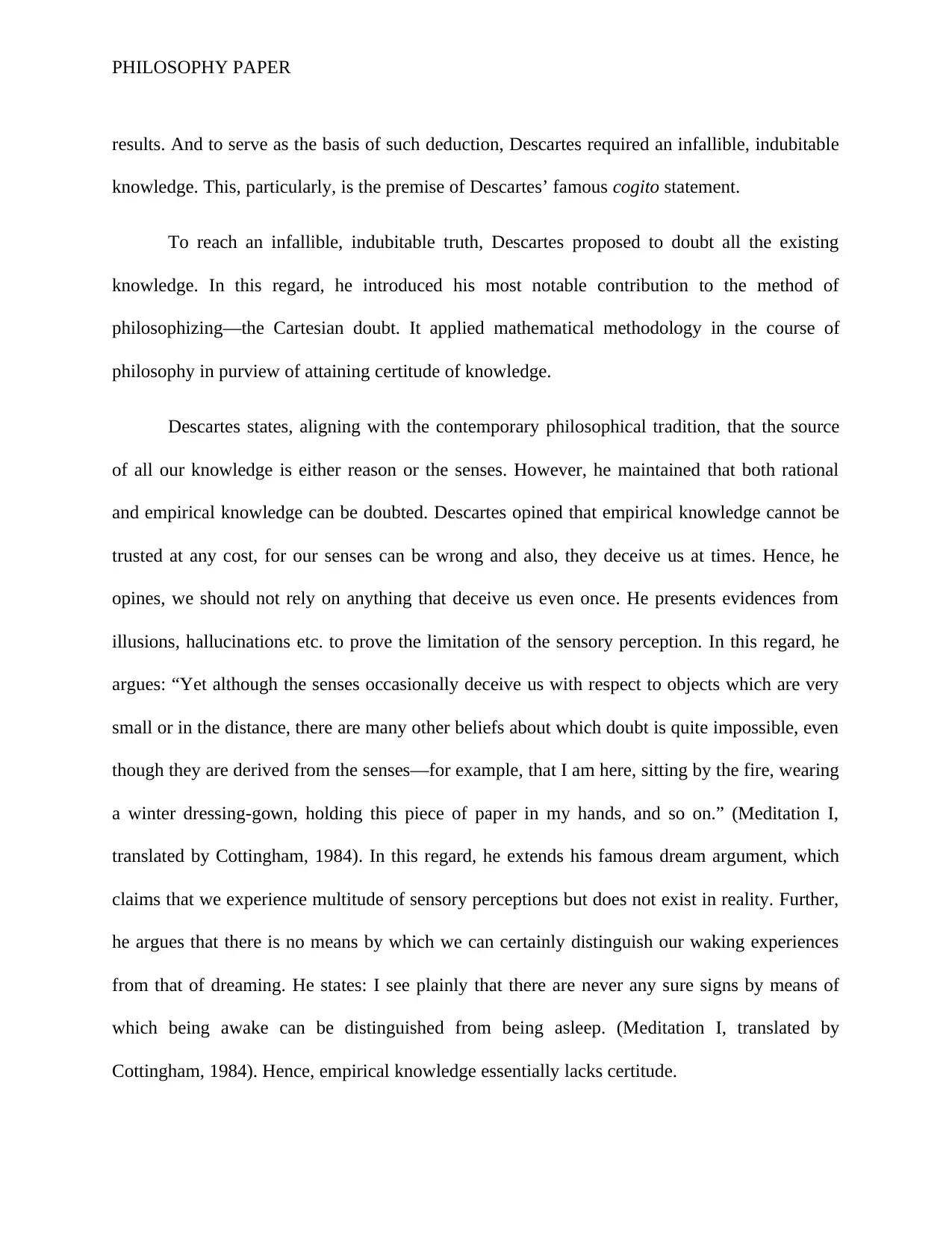
PHILOSOPHY PAPER
results. And to serve as the basis of such deduction, Descartes required an infallible, indubitable
knowledge. This, particularly, is the premise of Descartes’ famous cogito statement.
To reach an infallible, indubitable truth, Descartes proposed to doubt all the existing
knowledge. In this regard, he introduced his most notable contribution to the method of
philosophizing—the Cartesian doubt. It applied mathematical methodology in the course of
philosophy in purview of attaining certitude of knowledge.
Descartes states, aligning with the contemporary philosophical tradition, that the source
of all our knowledge is either reason or the senses. However, he maintained that both rational
and empirical knowledge can be doubted. Descartes opined that empirical knowledge cannot be
trusted at any cost, for our senses can be wrong and also, they deceive us at times. Hence, he
opines, we should not rely on anything that deceive us even once. He presents evidences from
illusions, hallucinations etc. to prove the limitation of the sensory perception. In this regard, he
argues: “Yet although the senses occasionally deceive us with respect to objects which are very
small or in the distance, there are many other beliefs about which doubt is quite impossible, even
though they are derived from the senses—for example, that I am here, sitting by the fire, wearing
a winter dressing-gown, holding this piece of paper in my hands, and so on.” (Meditation I,
translated by Cottingham, 1984). In this regard, he extends his famous dream argument, which
claims that we experience multitude of sensory perceptions but does not exist in reality. Further,
he argues that there is no means by which we can certainly distinguish our waking experiences
from that of dreaming. He states: I see plainly that there are never any sure signs by means of
which being awake can be distinguished from being asleep. (Meditation I, translated by
Cottingham, 1984). Hence, empirical knowledge essentially lacks certitude.
results. And to serve as the basis of such deduction, Descartes required an infallible, indubitable
knowledge. This, particularly, is the premise of Descartes’ famous cogito statement.
To reach an infallible, indubitable truth, Descartes proposed to doubt all the existing
knowledge. In this regard, he introduced his most notable contribution to the method of
philosophizing—the Cartesian doubt. It applied mathematical methodology in the course of
philosophy in purview of attaining certitude of knowledge.
Descartes states, aligning with the contemporary philosophical tradition, that the source
of all our knowledge is either reason or the senses. However, he maintained that both rational
and empirical knowledge can be doubted. Descartes opined that empirical knowledge cannot be
trusted at any cost, for our senses can be wrong and also, they deceive us at times. Hence, he
opines, we should not rely on anything that deceive us even once. He presents evidences from
illusions, hallucinations etc. to prove the limitation of the sensory perception. In this regard, he
argues: “Yet although the senses occasionally deceive us with respect to objects which are very
small or in the distance, there are many other beliefs about which doubt is quite impossible, even
though they are derived from the senses—for example, that I am here, sitting by the fire, wearing
a winter dressing-gown, holding this piece of paper in my hands, and so on.” (Meditation I,
translated by Cottingham, 1984). In this regard, he extends his famous dream argument, which
claims that we experience multitude of sensory perceptions but does not exist in reality. Further,
he argues that there is no means by which we can certainly distinguish our waking experiences
from that of dreaming. He states: I see plainly that there are never any sure signs by means of
which being awake can be distinguished from being asleep. (Meditation I, translated by
Cottingham, 1984). Hence, empirical knowledge essentially lacks certitude.
⊘ This is a preview!⊘
Do you want full access?
Subscribe today to unlock all pages.

Trusted by 1+ million students worldwide
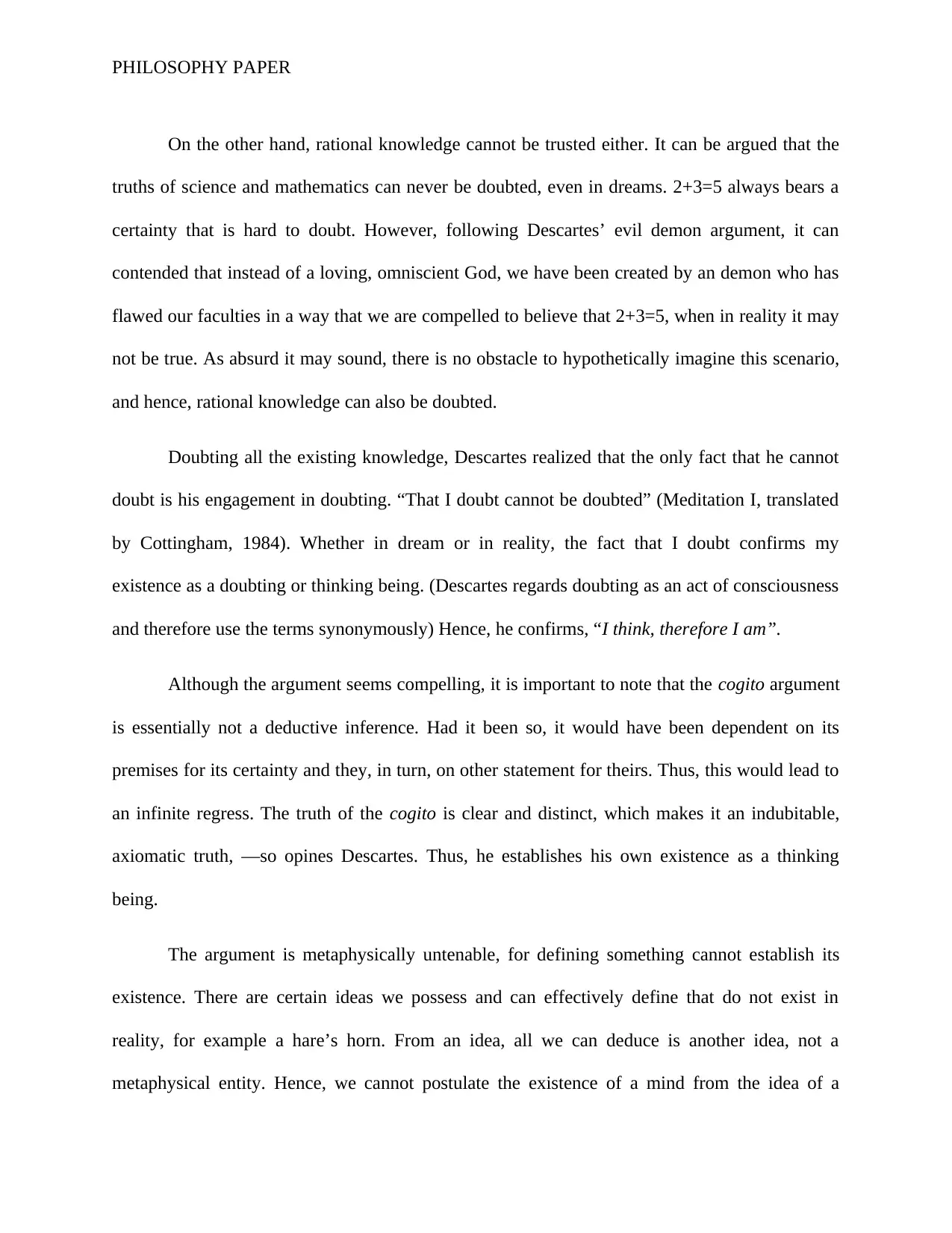
PHILOSOPHY PAPER
On the other hand, rational knowledge cannot be trusted either. It can be argued that the
truths of science and mathematics can never be doubted, even in dreams. 2+3=5 always bears a
certainty that is hard to doubt. However, following Descartes’ evil demon argument, it can
contended that instead of a loving, omniscient God, we have been created by an demon who has
flawed our faculties in a way that we are compelled to believe that 2+3=5, when in reality it may
not be true. As absurd it may sound, there is no obstacle to hypothetically imagine this scenario,
and hence, rational knowledge can also be doubted.
Doubting all the existing knowledge, Descartes realized that the only fact that he cannot
doubt is his engagement in doubting. “That I doubt cannot be doubted” (Meditation I, translated
by Cottingham, 1984). Whether in dream or in reality, the fact that I doubt confirms my
existence as a doubting or thinking being. (Descartes regards doubting as an act of consciousness
and therefore use the terms synonymously) Hence, he confirms, “I think, therefore I am”.
Although the argument seems compelling, it is important to note that the cogito argument
is essentially not a deductive inference. Had it been so, it would have been dependent on its
premises for its certainty and they, in turn, on other statement for theirs. Thus, this would lead to
an infinite regress. The truth of the cogito is clear and distinct, which makes it an indubitable,
axiomatic truth, —so opines Descartes. Thus, he establishes his own existence as a thinking
being.
The argument is metaphysically untenable, for defining something cannot establish its
existence. There are certain ideas we possess and can effectively define that do not exist in
reality, for example a hare’s horn. From an idea, all we can deduce is another idea, not a
metaphysical entity. Hence, we cannot postulate the existence of a mind from the idea of a
On the other hand, rational knowledge cannot be trusted either. It can be argued that the
truths of science and mathematics can never be doubted, even in dreams. 2+3=5 always bears a
certainty that is hard to doubt. However, following Descartes’ evil demon argument, it can
contended that instead of a loving, omniscient God, we have been created by an demon who has
flawed our faculties in a way that we are compelled to believe that 2+3=5, when in reality it may
not be true. As absurd it may sound, there is no obstacle to hypothetically imagine this scenario,
and hence, rational knowledge can also be doubted.
Doubting all the existing knowledge, Descartes realized that the only fact that he cannot
doubt is his engagement in doubting. “That I doubt cannot be doubted” (Meditation I, translated
by Cottingham, 1984). Whether in dream or in reality, the fact that I doubt confirms my
existence as a doubting or thinking being. (Descartes regards doubting as an act of consciousness
and therefore use the terms synonymously) Hence, he confirms, “I think, therefore I am”.
Although the argument seems compelling, it is important to note that the cogito argument
is essentially not a deductive inference. Had it been so, it would have been dependent on its
premises for its certainty and they, in turn, on other statement for theirs. Thus, this would lead to
an infinite regress. The truth of the cogito is clear and distinct, which makes it an indubitable,
axiomatic truth, —so opines Descartes. Thus, he establishes his own existence as a thinking
being.
The argument is metaphysically untenable, for defining something cannot establish its
existence. There are certain ideas we possess and can effectively define that do not exist in
reality, for example a hare’s horn. From an idea, all we can deduce is another idea, not a
metaphysical entity. Hence, we cannot postulate the existence of a mind from the idea of a
Paraphrase This Document
Need a fresh take? Get an instant paraphrase of this document with our AI Paraphraser
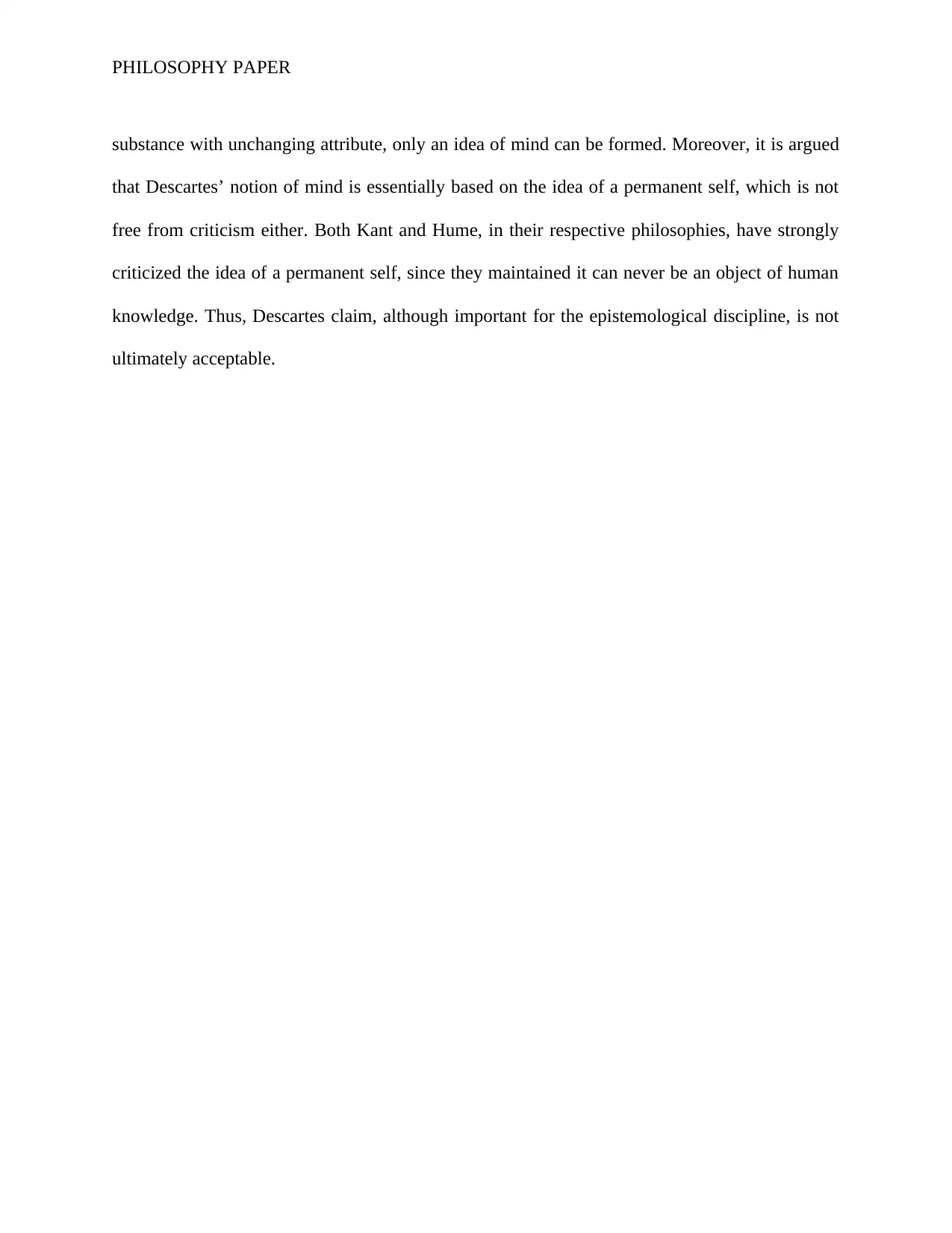
PHILOSOPHY PAPER
substance with unchanging attribute, only an idea of mind can be formed. Moreover, it is argued
that Descartes’ notion of mind is essentially based on the idea of a permanent self, which is not
free from criticism either. Both Kant and Hume, in their respective philosophies, have strongly
criticized the idea of a permanent self, since they maintained it can never be an object of human
knowledge. Thus, Descartes claim, although important for the epistemological discipline, is not
ultimately acceptable.
substance with unchanging attribute, only an idea of mind can be formed. Moreover, it is argued
that Descartes’ notion of mind is essentially based on the idea of a permanent self, which is not
free from criticism either. Both Kant and Hume, in their respective philosophies, have strongly
criticized the idea of a permanent self, since they maintained it can never be an object of human
knowledge. Thus, Descartes claim, although important for the epistemological discipline, is not
ultimately acceptable.
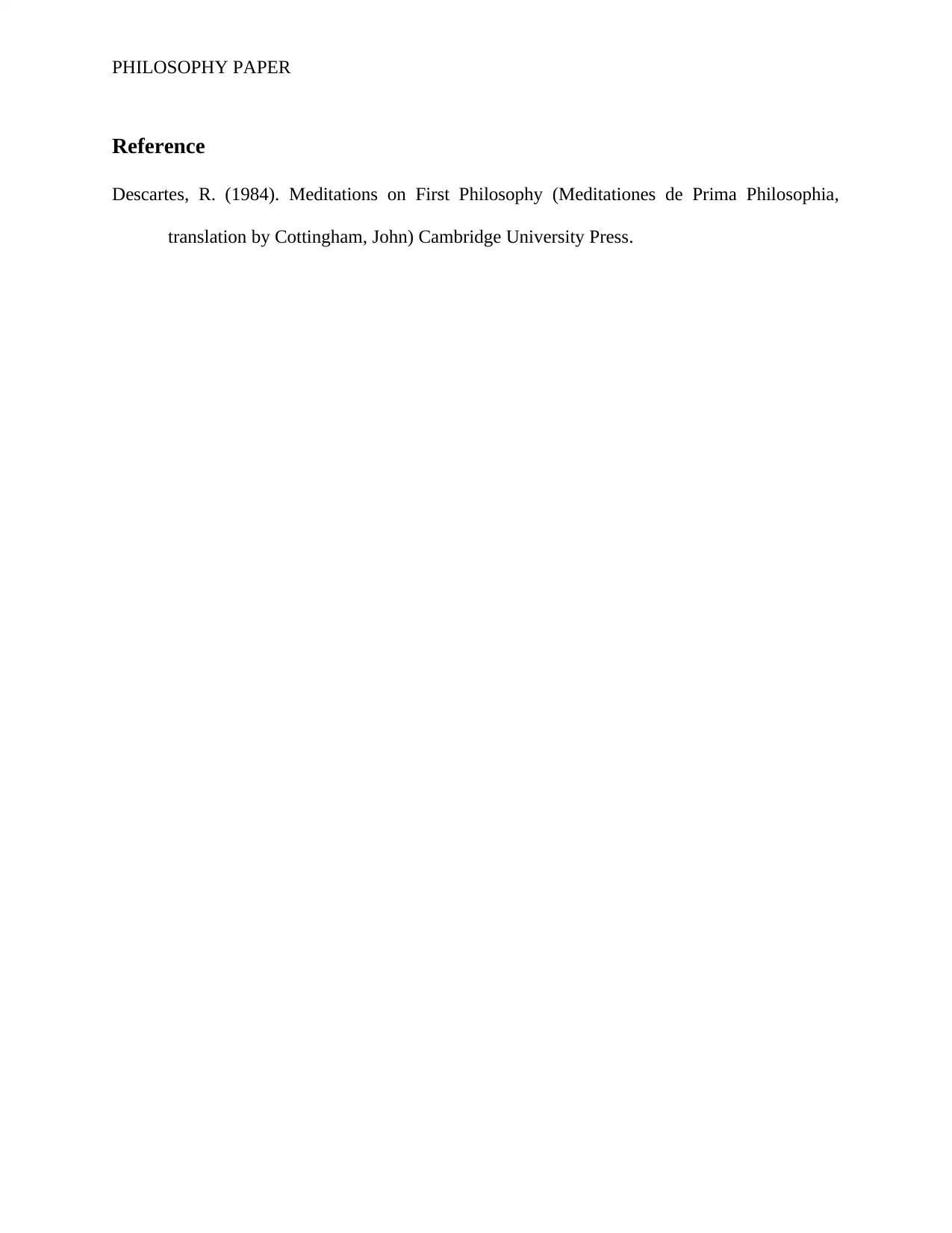
PHILOSOPHY PAPER
Reference
Descartes, R. (1984). Meditations on First Philosophy (Meditationes de Prima Philosophia,
translation by Cottingham, John) Cambridge University Press.
Reference
Descartes, R. (1984). Meditations on First Philosophy (Meditationes de Prima Philosophia,
translation by Cottingham, John) Cambridge University Press.
⊘ This is a preview!⊘
Do you want full access?
Subscribe today to unlock all pages.

Trusted by 1+ million students worldwide
1 out of 6
Related Documents
Your All-in-One AI-Powered Toolkit for Academic Success.
+13062052269
info@desklib.com
Available 24*7 on WhatsApp / Email
![[object Object]](/_next/static/media/star-bottom.7253800d.svg)
Unlock your academic potential
Copyright © 2020–2026 A2Z Services. All Rights Reserved. Developed and managed by ZUCOL.





